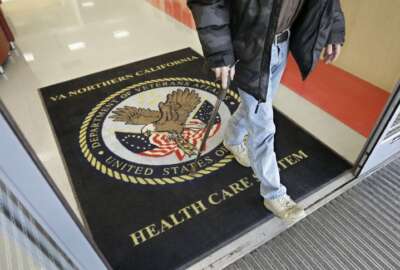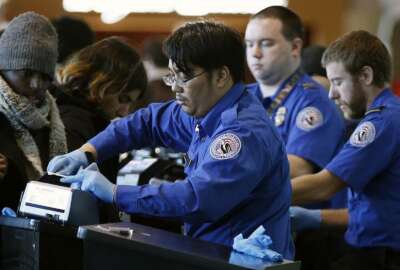
House of Representatives set to raise minimum salary for staffers
In today's Federal Newscast, the House of Representatives is trying to recruit more diverse and high-quality candidates, and get them to stay there.
To listen to the Federal Newscast on your phone or mobile device, subscribe in PodcastOne or Apple Podcasts. The best listening experience on desktop can be found using Chrome, Firefox or Safari.
- The House of Representatives is trying to recruit more diverse and high-quality candidates, and get them to stay there. In an effort to open doors to more underserved communities, the House is raising its minimum annual staff salary to $45,000. The deadline to implement the pay raise is September 1. The House is also set to vote this week on a resolution for Congressional workers’ right to organize and join a union. House Speaker Nancy Pelosi (D-Cali.) said the actions will help strengthen workplace rights for House employees.
- A bill to support the Department of Veterans Affairs’ workforce is coming into focus. The VA Workforce Improvement, Support, and Expansion Act would increase pay caps for some VA employees, including the directors of medical centers, physicians and dentists. It would also extend VA’s hiring, recruitment and retention authorities. The bill requires the VA to develop a national recruitment and hiring plan for rural areas, including best practices for recruiting health care professionals to rural VA facilities. Senate VA Committee Chairman Jon Tester (D-Mont.) and committee member John Boozman (R-Ark.) introduced the bill.
- President Biden will renominate David Pekoske to lead the Transportation Security Administration. Pekoske is originally a Trump administration appointee, having served as TSA administrator since August 2017. He is a Coast Guard veteran and former executive in the government services industry. Pekoske is in charge of leading the Biden administration’s push to bring pay and benefits for transportation security officers in line with the rest of the federal workforce.
- The Federal Emergency Management Agency saw some of the most positive results for employee engagement within the Department of Homeland Security. On the third round of the federal pulse survey, 71.8% of FEMA employees agreed or strongly agreed that time flies when they’re working. That’s compared with DHS overall, which gave the lowest scores governmentwide. When asked the same question, 20% of DHS respondents either disagreed or strongly disagreed that time goes by quickly at work. (Federal News Network)
- The Commerce Department lays out six key performance metrics to address workforce challenges and opportunities. In its new strategic plan, Commerce said it wants to ensure employees can collaborate, build knowledge, strengthen skills and use evolving technologies and methods to excel in new mission areas and forms of work. To measure progress, Commerce will focus on shortening the time it takes to hire new employees, create a candidate quality index and develop internal and external training courses to help employees obtain a wider array of knowledge and skills to improve the agency’s mission.
- Officials at U.S. spy agencies are thinking hard about how they use data. The Office of the Director of National Intelligence is drafting a new data strategy for the first time since 2017. Chief data officers across the 18 intelligence agencies are particularly focused on using automation to help deal with what IC Chief Data Officer Nancy Morgan calls a data volume challenge. “We’re collecting and producing more information than ever before, the IC is launching more collection capabilities than ever before at astounding volumes, certainly since I began my career 30-plus years ago in the government,” Morgan said. “It’s just astounding how much information we’re gathering.” (Federal News Network)
- The military will now exclude the weight of gun safes from the total weight allowance of household goods when moving. The weight allowance falls between 5,000 and 18,000 pounds. The Pentagon said the exemption is a way for the Defense Department to prioritize safety and health. Studies show that guns that are locked up help prevent suicides and protect children from accessing firearms.
- The Army is defending its next generation goggles after a scathing report. The Integrated Vision Augmentation System is supposed to give soldiers tons of data straight to the goggles they wear on their face. However, a recent Defense Department Inspector General report said the program is not going as planned and could be wasting nearly $22 billion. Now Army Secretary Christine Wormuth said she thinks the IG report is overblown and that the service will continue to develop the goggles as one of its 35 modernization priorities.
- Two agencies vow to continue working together on researching green technology and environmental justice solutions. The Energy Department and National Science Foundation announced a memorandum of understanding last week that officials said represents a unified approach to researching solutions to reach the White House goal of a 100% clean energy economy by 2050. Research topics may include renewable energy technologies such as bioenergy, building and water treatment technologies, hydrogen and fuel cells, agriculture, critical minerals and materials, and manufacturing.
- Another industry association presses Congress to fund IT modernization. The U.S. Chamber of Commerce is joining the call for Congress to do more to support IT modernization across the government. After nine technology associations wrote to House and Senate leaders on April 29, the chamber adds its voice to the cause of getting appropriators to fund the Technology Modernization Fund and other efforts. Additionally, the U.S. Chamber said it has been five years since OMB released a governmentwide IT modernization strategy and a new approach is needed to stress performance improvements and measure progress, prioritize value, transform and simplify user experience with government systems and services, and improve cybersecurity.
- Top Democrats on the House Oversight and Reform Committee seek more information from the investment firm that’s about to buy the federal lease to the Trump Hotel. Committee Chairwoman Carolyn Maloney (D-N.Y.) and Government Operation Subcommittee Chairman Gerry Connolly (D-Va.) are asking CGI Merchant Group to disclose the identities of investors behind the pending acquisition. Lawmakers also want a list of Trump family members involved in the negotiations of the deal. The Trump Organization is planning to sell its lease to the Trump Hotel building for $375 million.
- Site locations for federal projects in the DC region can have big impacts on equity and inclusion. That’s why the National Capital Planning Commission’s equity action plan makes capital improvements and comprehensive plans priorities. The plan also talks about NCPC’s Beyond Granite pilot project to make public memorials more representative of America’s diversity, and it calls for greater public outreach when choosing locations for federal buildings. NCPC is an independent agency that collaborates on both federal and local projects. (Federal News Network)
Copyright © 2024 Federal News Network. All rights reserved. This website is not intended for users located within the European Economic Area.
Eric White
Eric White is news anchor and Federal Drive producer at Federal News Network.
Follow @FEDERALNEWSCAST





